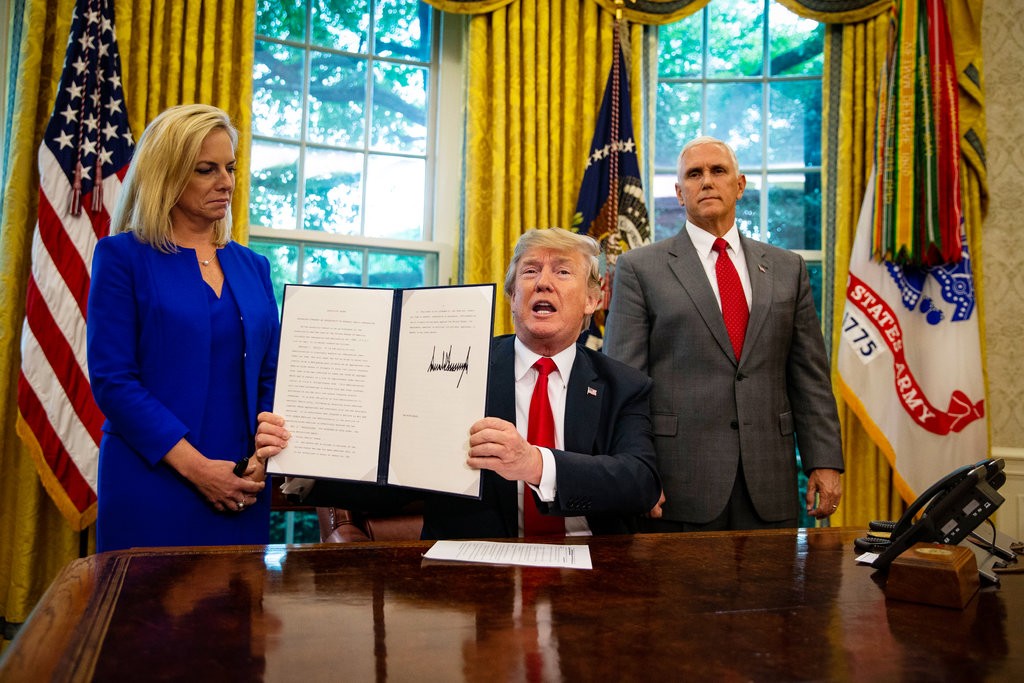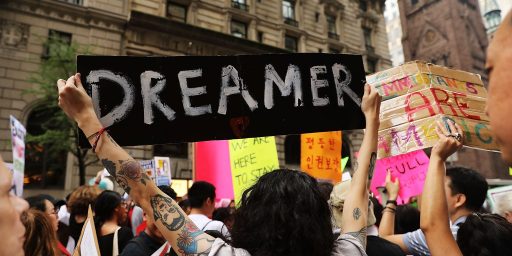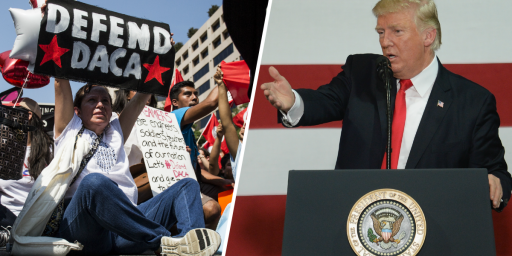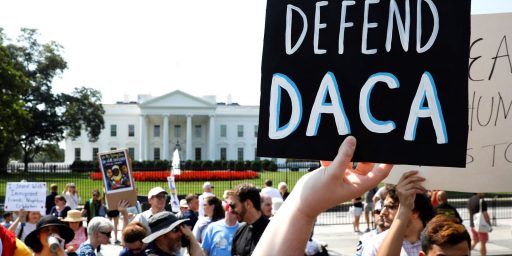Overturning Executive Orders Not as Easy as it Looks
Kevin Drum makes an important point.

Kevin Drum uses a story from a few days back (“DACA Gets Big Win in Court From Judge Who Thinks It’s Illegal“)
Just before the beginning of Labor Day weekend on Friday night, a federal judge wrote that the Deferred Action for Childhood Arrivals program was illegal, and would likely fail to pass constitutional muster in the future. And yet, he ruled that it could continue for the time being.
Andrew S. Hanen of the Federal District Court in Texas said that President Obama exceeded his constitutional authority in 2012 when he created DACA, which protects undocumented immigrants brought to the U.S. by their parents from deportation. But, Hanen reasoned, ending the initiative abruptly after six years would create an unreasonable and unhelpful level of chaos. He compared the act of doing so to unscrambling an egg.
“Here, the egg has been scrambled,” Hanen wrote. “To try to put it back in the shell with only a preliminary injunction record, and perhaps at great risk to many, does not make sense nor serve the best interests of this country.”
to make an important point:
I only have one purpose here: to demonstrate the difficulty of repealing executive orders put in place by a previous administration. It is very much not just a “stroke of a pen” that’s required, but a lot of people don’t seem to get this.
There are basically two ways that an executive order can take root: time and time. In the first case, it’s the time taken to produce a detailed plan supported by scientific judgment and public hearings. Once that’s done and an EO is finalized, it can’t simply be tossed in the ash can on a presidential whim. That’s typically considered “arbitrary and capricious” and courts won’t allow it.
In the second case, if an EO has been around for a while, judges will rule the same way Andrew Hanen did. He was skeptical of DACA, but after six years the public has a right to expect that it’s the current law of the land unless it goes through a thorough review by the courts. Until then, the president can’t just ask for a preliminary injunction and then sit back and watch the chaos unfold.
I must confess that, even though I had quite a number of Constitutional Law, Administrative Law, and like courses in my undergraduate and masters work in political science, I didn’t fully appreciate this until the current administration. I’d always understood it as a quasi-legislative power held in the hands of the Chief Executive to use pretty much as he saw fit. That it seemed that way belied an underlying fact:
Generally speaking, it takes a lot of effort to get an executive order fully established: it requires real work, real policymaking, and real public consultation. Once it’s in place—especially after it’s been in place for a few years—it’s considered well grounded and justified, and can’t be arbitrarily repealed by a new president who happens not to like it. If you want to repeal it, you have to go through the same process of policymaking and public consultation to demonstrate that the original process got something wrong. That takes a while.
Oh, and generally speaking, the policymaking has to be real, not made-up. That is, you have to do real research and real cost-benefit analysis and real science. Some presidents are better at that than others.
While I disagree with President Trump on many of the policies of President Obama’s that he wants to overturn, I’m generally of the Live By the Sword, Die By the Sword school. That is, if you put your policies into place by executive fiat rather than the hard work of compromise necessary to pass it into law*, you shouldn’t be surprised to see them overturned by the next administration. Alas, if the administration is lazy and incompetent, it’s not so easy.
Beyond the practicalities cited by Drum and Hanen, there’s also the Administrative Procedures Act, signed into law way back in 1946. Essentially, Congress conceded the fact that the Executive Branch had taken over many of the enumerated powers of the Legislative Branch out of sheer practical necessity so put into place a process to ensure legislative oversight. While presidents can in fact do issue a substantial amount of direction to the agencies under their command, they’re limited in their ability to make major swings in well-thought-out regulations.
__________________
*Yes, I’m fully aware that Obama faced an obstreperous Republican Congress for most of his administration. Them’s the breaks.





I believe this also holds true with changes in regulations. If the Trump admin wants to do away with a regulation, they need to do the work to show that it will not be harmful or that it will have positive effect, just like you do when you implement regulations. I think Drum has also written on this, but so have some conservative writers. Pethokoukis at AEI is pretty conservative and pro- markets. There just isn’t much evidence when people go look for it that deregulation has changed anything, and part of that is because you have to do the work needed to deregulate. You can’t just sign stuff away.
https://www.newsweek.com/trumps-bonfire-regulations-boosting-economic-growth-805318
Steve
Kevin Drum’s article is pertinent for the anti-Trumpists who believe the next Dem president will wipe away his legacy. It won’t be easy. A bright spot for the reversist is that the Trump administration has been incredibly sloppy in drafting many of these orders. The number that are tied up in court for issues that revolve around not following proper processes may mean that a number will not achieve the ‘time’ needed to become accepted law.
I’ve said before that the next president, regardless of party, will spend much of his/her first term cleaning up the messes left by Trump. Likely to the detriment of their own policy agenda.
@Sleeping Dog:
Thus we will continue the pattern of the Democrats coming in and cleaning up the mess left behind by the Republicans. One can also expect, again, the R’s to throw things and stomp their feet while complaining loudly that the D’s are not cleaning it up fast enough.
I guess what’s always bothered me is that opinions on executive power are usually not guided by principles of governance, but by narrow policy ends. Few, including Kevin Drum, seem perturbed by the ratcheting of Executive power as long as it serves their preferred outcomes.
I think the big comparison here is the administration’s failed attempts at the travel ban and ending DACA, and their successful attempts at ending net neutrality.
The reason the latter succeeded where the formers failed is because the latter was done through the normal regulatory process rather than at the whim of Trump’s twitter feed.
@Andy: I don’t see executive powers as anything other than accomplishing what cannot or will not be accomplished by Congressional action. From that standpoint, it’s always about ends and so is always also dependent on those ends being good governance in addition to narrow policy goals. Mostly, I think that good policy has been the outcome, but YMMV.
@Andy:
That “ratcheting” apparently happened for you lot in 1946.
It is a restriction on executive power to not allow rapid fiat changes but require process and review.
James: “Yes, I’m fully aware that Obama faced an obstreperous Republican Congress for most of his administration. Them’s the breaks.”
Where ‘obstreperous’ means ‘to a degree not seen in the history of the Republican (except maybe in the run-up to the Civil War).
I hope that we win the Senate, so that we can shut Trump down 100% for the next two years.
It’d be sweet to hear the Tea Party howl about obstruction then.
@Lounsbury:
The ratcheting is about using a tool in ways that continually expand the de facto powers of the Executive – call it creeping normalcy. The fact that the current administrative rules system was created in 1946 does not mean its limits, norms, and implementation have remained the same since – quite the contrary.
I suppose some may take the view that the powers of the Executive are essentially limitless unless and until they are post hoc actively constrained by Congress or the Judiciary, but I do not share that view. And neither do most partisans and advocates who, again, champion ends over means.
@Andy:
FTFY, you’ll get my bill in the mail. (wildly inflated because you don’t seem to understand the Kevin Drum has very little influence over this, but that Paul Ryan and Mitch McConnell do)
PS: a small correction. Leave out the “Republican” qualifier on congressman. Ryan and McConnell are just the latest perpetrators among a long list of legislative leaders who were incapable of getting their preferred laws thru congress..
This is in the same place as the idea of SCOTUS doing too much “legislating”…perhaps if those in Congress actually did their jobs, those in the other two branches of government wouldn’t need to overstep their bounds…
@OzarkHillbilly:
I believe Congress (as well as those who lead it) deserves the bulk of the blame for enabling and failing to check executive power. But again, this falls into the ideologically-driven ends-over-means paradigm. Congress, it’s members and leaders, too often put their ideological preferences above institutional prerogatives.
@Andy: I’m in total agreement with you on that point.
@Just nutha ignint cracker:
That seems to imply that Congress is an unnecessary (or even harmful) check-and-balance, and should be ignored or simply abolished (why pay for it if it has no powers?).
Do you really think its a good idea to invest almost sole power in one elected official? That is what happens in practice in many parliamentary gov’ts (the UK and Canada for instance), where the Prime Minister holds far more practical power than the American President. However, even in those countries, in theory the parliament (including the Prime Minister’s own party) can completely ignore the Prime Minister’s orders. Giving the President the power to override Congress with an executive order has no such safeguard.
Trump shows why that is a very bad idea – as does a very long history of absolute power being abused. Basically you’re suggesting that benevolent dictatorship can be a good thing. Which it can, except the same powers apply to the common, anything but benevolent dictators.
@george:..…benevolent dictatorship can be a good thing.
Say what???
Isn’t this an oxymoron?
Dictators deprive their citizens of the opportunity to remove their rulers.
There is nothing benevolent about that.
@Mister Bluster:
The argument I was responding to is that Presidents have to use executive orders when Congress blocks them from doing ‘good things’. I am saying (re-read what I wrote) that giving the President the power to enact executive orders is giving them dictatorship powers, and that even if you like the ends to which those powers are used it will lead to much more evil than good.
That is, I’m strongly against allowing executive orders – concentrating power in one office is never a good thing in the long run.
If its the phrase ‘benevolent dictator’ you object to, I didn’t make it up, and in fact the concept that has been around a very long time, and was seriously suggested by someone much more intelligent than I am – Plato’s philosopher kings are benevolent dictators. Note that despite Plato being several orders of magnitude more intelligent than me (no one’s going to be seriously studying my philosophy 2500 years from now, or even 1 second from now, come to think of it), I still think he’s wrong on this – dictatorship always ends in grief.